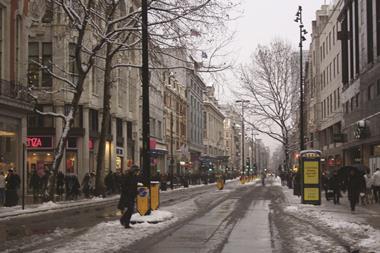Hopes of greenshoots of recovery in the high street were dashed today when the latest ONS stats were announced, despite favourable Easter Weekend dates leading to expectations of a year-on-year rise.
Hopes of greenshoots of recovery in the high street were dashed today when the latest ONS stats were announced. Despite favourable Easter Weekend dates leading to expectations of a year-on-year rise, sales in March actually fell by 0.7% compared with February.
The ONS has quickly pointed to the second coldest March on record, but with online sales remaining high at 10.4%, weather conditions will soon not be the reliable fallback it once was.
So, why the disappointing figures?
The biggest falls were in non-food and fuel. The latter is particularly interesting, because if people are not filling up their cars so often, this implies a shift away from out-of-town supermarket and back into the high streets, which could and should play into retailers’ hands.
But the data points to two key factors driving consumer spending: house purchases and disposable income.
Housing transactions are still down 50% on levels seen in the mid-2000s, which is bad news for the home and furnishings sector. This is highlighted by the sharp decline in non-food spending in March.
Meanwhile, disposable income is being significantly affected by the increasing gap between wage and price inflation. Underlying inflation in the UK is running at just below 3%, while wage inflation meanwhile stands at a mere 1%.
Significant elements of household spending are seeing much higher rates of inflation: food inflation is at 4%; gas and electricity are at 6% and 7% and insurance premiums are up by as much as 10%.
Unemployment has crept up to 7.9%, which is why consumers are understandably still so wary about hitting the high street. Put simply, consumers are being squeezed from all directions, with high inflation, falling wages and poor job security.
Though there is little retailers can do about the economic malaise, they are not helpless. In such hard times, they must search for every opportunity inside their business to improve operational efficiency and reduce costs.
Kate Swann has spent the last eight years doing this at WH Smith. Between 2004 and 2012, she improved performance from a £72m loss to a £69m profit, during some of the toughest years for UK retail in a generation.
Similarly, Next has just recorded a 9% increase in operating profits and has doubled its share price in the last two years.
These two retailers demonstrate that a ruthless focus on operational excellence, cost control and cash management can more than offset the economic storms.
While the shift to digital presents retailers with a fundamental change to business systems and infrastructure, it is equally important that they stick to the traditional knitting and manage the core operating process effectively.
Those retailers who do this will survive, and even grow. Those who lose sight of this will continue to struggle, at a bleak time for their customers.
Dan Murphy is a managing director at consultancy Alvarez & Marsal





















No comments yet